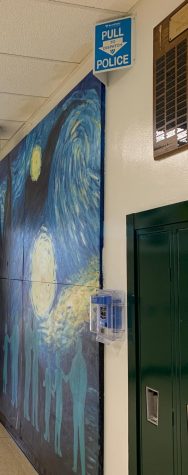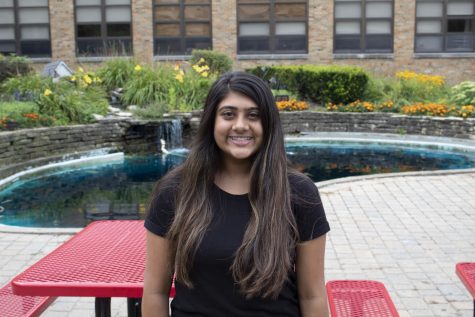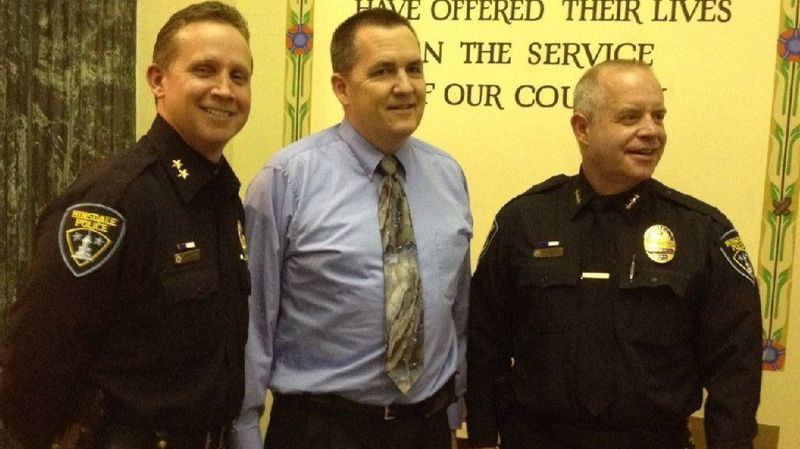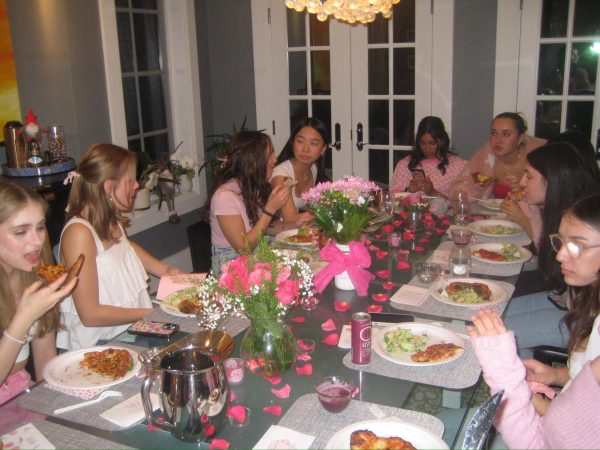New changes made to security at Central
Courtey of Kimberly Fornek / Pioneer Press via The Chicago Tribune
D86 added many new security officers to Central and South, including retired Hinsdale police chief Kevin Simpson (left).
This new school year brought many changes to Central. A semester system replaced the quarters, and many changes have been made to the building and the security team. Many students noticed the increase in the security guards and installed cameras.
“It’s kind of annoying because they aren’t really nice,” said Joey Pellegrino, senior, about the new security guards. “[The installed cameras] don’t really affect me but they make our school more secure.”
According to a hall monitor, the district and school board decided to recruit new security guards.
Recently, we sat down with Kevin Simpson, head of security, to discuss these new changes done to Central’s security regarding installed cameras as well as new security recruits.
DA: Why did some security guards transfer to South and others remained at Central?
Simpson: “Some people stayed here because they chose to, but we hired 15 people total to balance the new people with the experienced people. We wanted to balance the same number at South and at Central. Eight at Central, seven at South, so it’s one different based off of logistics and the number of students.”

In an emergency, pulling this blue light will immediately notify the police.
DA: To what extent are the security guards allowed to have physical contact with the students?
Simpson: “It is very limited, and I can tell you it’s in emergency situations. All the officers went through a process called CPI training (nonviolent crisis prevention and intervention program), and that gives them the ability to diffuse and de-escalate situations but only when there is another student harmed are they allowed to go hands-on; that is in a very passive way depending on the situation.”
DA: What are the officers usually looking for when stopping a student? Something they watch out for?
Simpson: “There’s a lot if you’re monitoring student behavior or the interaction among students you can see things begin to escalate based on their audio or their volume; their tone if it’s argumentative, or their body language can kind of dictate how things are escalating. A lot of the security officers are police officers so they are able to recognize that behavior and at that point, they can try and intervene before things can become physical. They will try to stop the two parties and de-escalate the situation depending on what’s going on with two students. The CPI training taught officers how to handle the situation in a passive way. Hands-on is an officer’s last resort if someone is physically being injured or battled.”
DA: Can you give us a background on ALICE training?
Simpson: “When I came in two years ago they had some trouble consulting with the district. I recognized that the lock-down procedures here were traditional in the sense of what should be done by students and staff. [ALICE is] more of a progressive and empowering format that was available out there, so they recommended that we transformed into this, and it was fully supported. The students will learn it is more of an optional-based alternative during a critical incident that allows you to contribute to our own survivability. Because you’re given the opportunity to make the decision, you aren’t restricted to one course of action.”
DA: Why is ALICE new this year?
Simpson: “I think they tried to implement parts of it but it wasn’t done collectively or through ALICE which is an organization that has been going on for a while, this was a suggested format for different operations at school.”
DA: Was there a reason that the security cameras were installed this year and not in the previous years?
Simpson: “The system was so old, it had to be renewed. It was part of the security improvements that was scheduled for a while. The timing was the sooner the better, these changes were severely needed. This gives us the ability to improve our school now and for the upcoming years.”

Zoya Anjarwala is a friendly senior who is a section editor for Devils’ Advocate. She is also a peer leader to her fellow freshmen. She loves to travel,...













